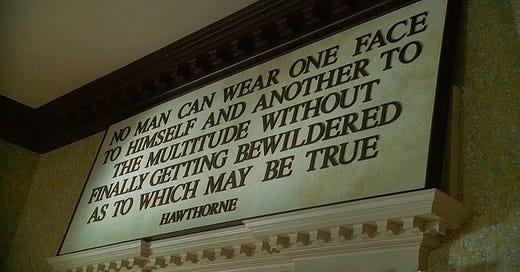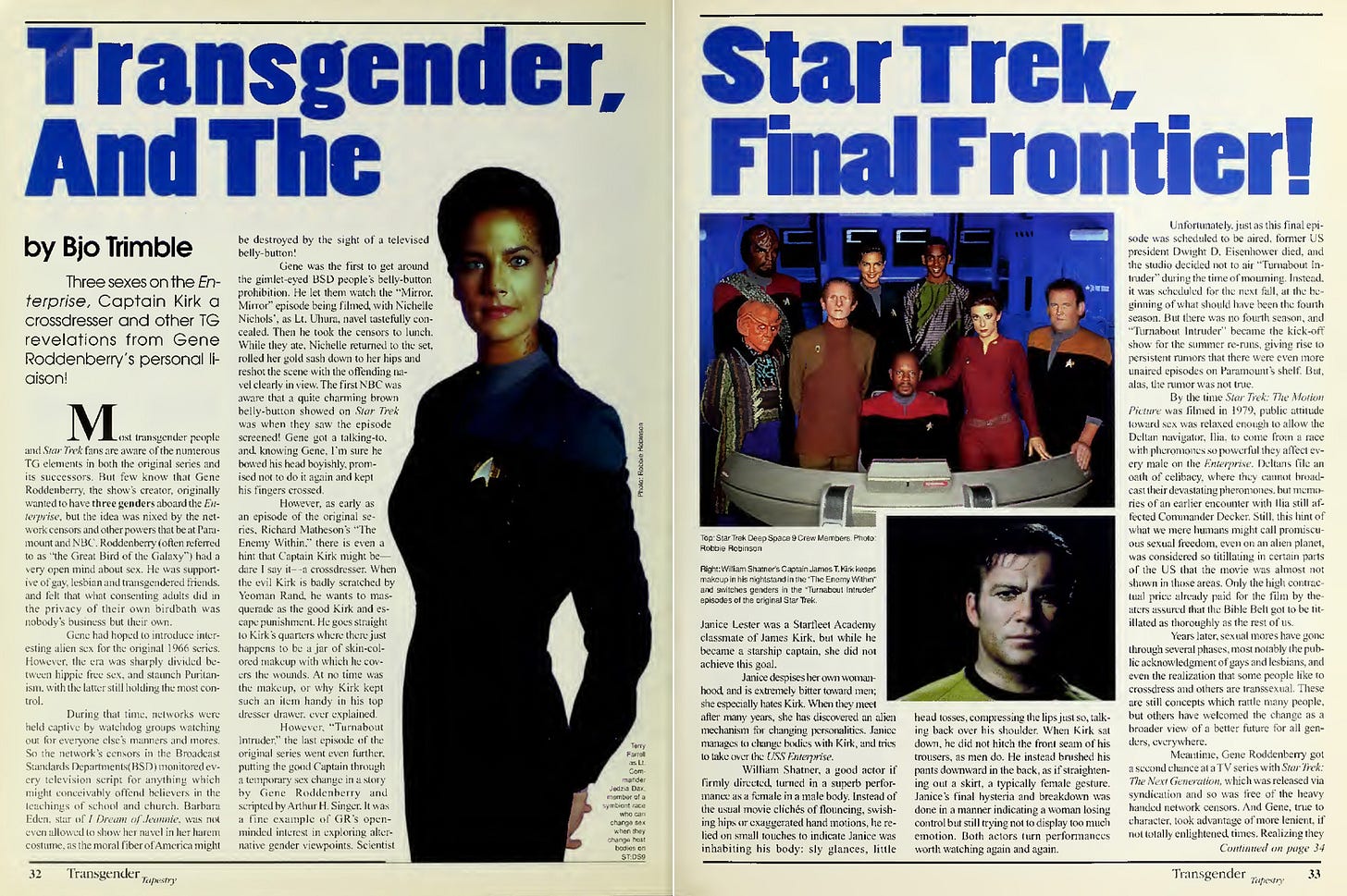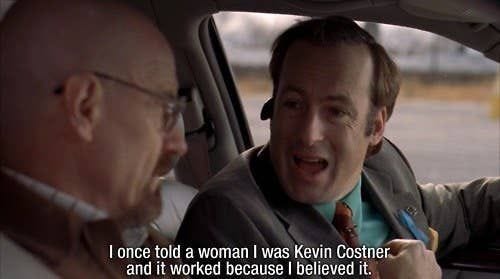Happy Trans Day of Visibility! In today’s Nest, I ask the brave question: is it a coincidence that you can’t spell TDOV without ‘TV’? Or is it possible that… all your favourite TV shows are about transness? Let’s investigate.
Mad Men
I’m beginning with the most overtly trans show out there. Mad Men’s transness isn’t even subtextual, it’s just text: it’s literally about a man who goes by a name other than the one he was assigned at birth, and lives in fear that he will be ‘found out’ by his peers.
Supporting this perspective is Peyton Thomas’ piece on The Niche titled ‘Don Draper Was a Trans Man: A Niche Interview with Jon Hamm’. It’s truly a revelatory piece of writing — you will never view Draper, or the series, in the same way again.
Ultimately, Mad Men is a compelling watch when it comes to gender stuff precisely because of how strict gender roles are in its 1960s Madison Avenue setting. “[Don] cloaks himself in the trappings of masculinity,” Thomas writes, “the suits, the parade of women, the husky timbre of his voice.” It’s all very Judith Butler — men and women constructing their genders for public approval and social mobility. Because of this, you can probably project transness onto other Mad Men characters, too. Is Joan stealth? Who’s to say? (Me. And I say sure, why not!)
The Sopranos
Much like Mad Men, the extremely gendered milieu of The Sopranos paradoxically allows for a lot of transgender identification. Gender is pushed to such absurd heights in The Sopranos that it begins to feel campy, drag-esque — the women are doing so much woman, with their nails and hair and jewellery, and the men are doing so much man, with their violence and hairiness and profanity, that it ultimately all reveals itself to be a performance. Much of The Sopranos is about men and women working very hard to sustain the performances of their assigned genders, and the anxieties and conflicts that arise when they fail to do so.
P.E. Moskowitz recently published an essay in Vulture on how Carmela Soprano helped her come into her own transness. Edie Falco herself was aware of the gender performance going on with Carmela, as Moskowitz notes: “Falco has said that the elements of Carmela’s look weren’t accoutrements, but integral parts of the process of becoming Carmela — so powerful that they pushed her into being a different person.”
The Sopranos is, very often, a wonderful exploration of the complicated trappings of gender — and of being trapped by gender. “Carmela may be a mob boss’s wife,” Moskowitz continues, “but she is also the embodiment of a womanhood that many, cis and trans, yearn for, against their better instincts: one that replicates the infantilized yet secure state of the suburban housewife, where we can be both victim and perpetrator, but mostly have our agency taken away from us.”
For something a little lighter, read this, from Daniel M. Lavery: ‘Which Misconception About Testosterone Therapy Does Each Character From The Popular TV Show "The Sopranos" Subscribe To?’
Twin Peaks
Duh:
Twin Peaks: The Return
Duh again:
Star Trek
Okay, so, apparently in Deep Space Nine there’s these creatures called Trill that exist within humanoid host bodies, and their gender can change from host to host. The actor who played a Trill was literally on the cover of Transgender Tapestry magazine in 1996. Here’s the article that was featured inside:
The opening of the article notes that “Gene Roddenberry, the show’s creator, originally wanted to have three genders aboard the Enterprise, but the idea was nixed by the network censors and other powers that be at Paramount and NBC”.
Also, there’s the episode of Star Trek called ‘Turnabout Intruder’, where a woman swaps bodies with Kirk, which, sure, is probably a “caricature and condemnation of the feminism of the late '60s, evoking a fear of powerful, power-hungry women”, but if you want to, you can tell yourself it’s just about being trans.
Also, calling on Lavery again, there’s his assertion that Captain Kirk is a beautiful lesbian.
Hannibal
As much as I love Mads Mikkelsen, I haven’t seen Hannibal yet, because I am a scaredy-cat. I know enough to know that it’s queer, but trans stuff isn’t discussed around it as often. Enter Jamie Beckenstein’s essay ‘On Hannibal Lecter, transness, and creation through annihilation’:
I’ve fallen in with a group of trans people who bring up Hannibal when they want to test the waters for flirting. It’s not about signaling what we’re into so much as how we think about bodies.
…
Top surgery is the single best decision I’ve ever made. It is also the most horrifying. They stopped my breathing and cut me open and took parts of my body away from me. When I woke up, there was less of me than there had been before. My scars feel like rubber, and for years I didn’t touch them because I would get nauseous. One side of my chest ripples concave when I move, and when I catch it in the mirror, it always takes me a millisecond to recognize myself as solid. It doesn’t feel like I created my body so much as I asked someone I didn’t trust to destroy it.
This feels like a nice accompaniment to last week’s Nest, which also dealt with questions of the flesh and the legacy of The Silence of the Lambs.
The Golden Girls
Now we’re really starting to reach. As you can probably tell, this list is organised by how easy it is to justify my position — and a lot of it is just me returning to the same handful of trans writers to do so. I’ve never seen The Golden Girls, so I can’t make an argument for its trans resonance, but I have read Daniel M. Lavery’s essay “on Dorothy, Blanche, and transition”. Here’s an excerpt:
That show, that particular vision of retirement, had promised me something, implicitly, or rather through that show and other visions like it I had promised myself something I could now no longer keep. My security had rested in a sort of negotiation with compulsory heterosexuality such that when all my friends had outlived their husbands, we’d all get to move in together and eat cheesecake and wear comfortable loungewear for our seven extra statistically-predetermined years of life. Whatever else might change in life, we could at least count on that.
You can read the full piece here.
Breaking Bad
This is just me being stupid, but like, the part where Walt says: “It’s solution, dissolution, just over and over and over. It is growth, then decay, then transformation.” Is that anything?
ER/Grey’s Anatomy/Whatever other hospital shows people watch, I’m not a nerd
I don’t know, it’s about surgery?
Wait, Breaking Bad again
This? Is this trans?
Okay, we’re getting into Silly Town now. Time to stop. I think I’ve covered the essentials, but if I’ve missed anything, and you want to tell me about your favourite instances of transness on a popular television series, get in touch! Or don’t! The point is, every show is about transness if you want it to be.
Thanks for reading, and again, happy TDOV.










